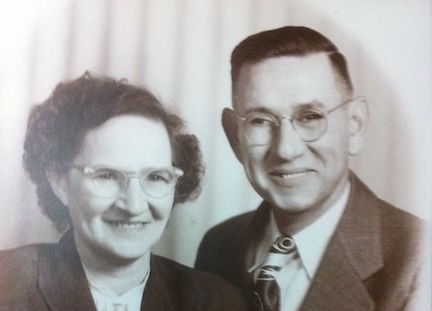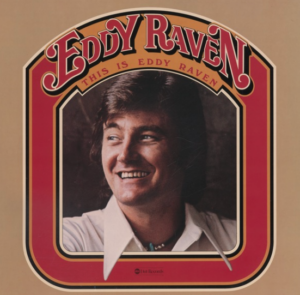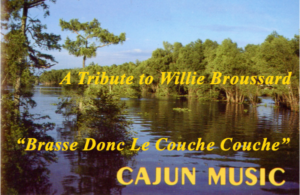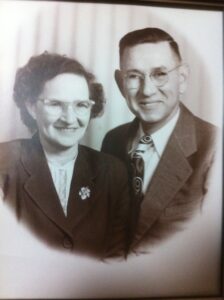
The story of a family whose businesses, values, and devotion to community became part of the town’s identity.
In the early 1900s, when Maurice was still a cluster of dirt roads and cotton fields, Ducré Broussard and Olive Trahan began a life together that would weave their family into the very fabric of the town.
In the quiet, slow-moving days of early 1900s Maurice, Louisiana, where the roads were made of dirt and neighbors knew each other by name, the story of Ducré Joseph Broussard (1899-1952) and Marie Olive Trahan (1899-1958) began. Born in 1899, just a few miles from the cotton fields and bayous, their lives would grow together in a way that helped shape not only their family but the community around them.
Ducré and Olive came of age during a time of significant change. Louisiana, like much of the South, was emerging from Reconstruction and adjusting to the social and economic shifts that followed. Yet in small rural towns like Maurice, life remained rooted in land and kin. Families survived and thrived by leaning on one another, growing food, trading labor, and raising children with strong backs and stronger wills.
History Fact: The Town of Maurice was formed by and named after Maurice Villien in 1875, calling the area Mauriceville. The State would formally recognize it as a Town on December 27, 1911. Maurice’s son would open a store in 1901 called Villien Brothers Store. It would also house the mail service from 1895 to 1951. Before Maurice settled and formed the town, the region was known as Broussard Cove.
Ducré, the eldest of six children, learned early the responsibility that came with his position. His parents, Demas and Elizabeth Broussard, were among the early settlers in the area, and the expectation was clear: you took care of your own. That value held firm when Ducré married Olive, herself a woman grounded in tradition and perseverance. Together, they would raise five children, modeling a life of diligence and dignity.
By the 1920s, Ducré found steady work at the Villien Brothers store in Maurice. It was more than a place to buy flour or fence posts; it was the unofficial hub of the town. Locals stopped not only for supplies, but also for conversation, news, and the occasional favor. Behind the counter, Ducré learned the rhythms of small-town business: who had a bumper crop, whose fields had flooded, who could settle up that day, and who would need a little more time. Over nearly 25 years, he became part of the store’s heartbeat, a man neighbors counted on for fair dealing and quiet generosity.
In these years, Maurice wasn’t just a village; it was a web of interdependent families. Everyone knew that when times got hard, you leaned on each other.
History Fact: In the 1920s, most families in Maurice shopped once a week, arriving on foot, by wagon, or in a Ford Model T if they were lucky.
When the Great Depression arrived in the 1930s, Maurice felt its weight. Money was scarce, credit tighter still, but self-reliance was nothing new here. Families grew their food and livestock, hunted wildlife, repaired what they had, and shared what they could. Through it all, Ducré’s dependability only deepened his standing in the community.
History Fact: During the Great Depression, a sack of flour cost less than two dollars, but that was still a full day’s wages for many farm laborers.
In 1949, a new opportunity came his way. V J Comeaux and Willie Meaux, owners of the Abbeville Dixie Auto Lec, wanted to open a store in Maurice. They knew Ducré’s reputation from the Villien Brothers years and trusted him to run it. The Dixie Auto Lec store brought modern conveniences, including appliances, hardware, and auto parts, into a farming town still steeped in old habits. Locals came not just to shop, but to linger, swapping stories over the counters.
The store was set up in a building previously occupied by Dr. Carroll Mouton, who had served as the town doctor and mayor for over two decades. The building was located where the current Ray’s Quick Stop is located. The Dixie Auto-Lec name itself blended “Dixie” for the South, “Auto” for auto parts, and “Lec” for electric appliances, a sign that the modern age was arriving in Maurice. On opening day, August 20, 1949, it drew a crowd.
History Fact: Dr. Carroll Mouton moved to Maurice in 1927 and practiced medicine there until 1949. He served as the Mayor of Maurice for most of this time, from 1928 to 1949. Upon his retirement in 1949, he and his wife, Anna Nugent Mouton, moved to the south side of the Judice Community.
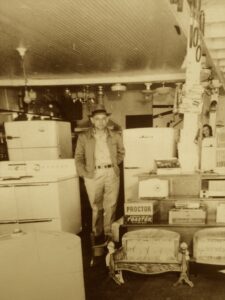
Ducré understood he needed a pickup truck for the Dixie Auto-Lec business. According to a family story, his brother Sidney Broussard, a rice farmer living west of Maurice, had a pickup truck. The story is that Ducré offered Sidney 20 acres of farmland and $1,200 for a Plymouth Pickup truck. This became Ducré’s business vehicle.
History Fact: Plymouth last manufactured pickup trucks in 1941. Production stopped that year when civilian vehicle manufacturing was halted in the U.S. as the country shifted to wartime production during World War II. Plymouth never returned to making pickup trucks after the war.
Then, just two years later, in 1951, tragedy struck. At just 51 years old, Ducré suffered a heart attack. In those days, there were no emergency rooms within reach, no bypass surgeries. Fortunate that the small town had a doctor, Dr. Harold Trahan, who served as the local town physician after Dr. Mouton had retired. Dr. Harold, a lifelong resident of Maurice, provided the best care possible for Ducré, whom he ordered to remain bedridden. Dr. Trahan would routinely make house calls as doctors once did.
A year later, mostly bedridden the entire time. On the anniversary of his first attack, he decided to venture out of his home to accompany his daughter Joyce, her husband L.J., and his granddaughter Janice to Allen Breaux’s photo studio to select Janice’s baby picture. On the same visit, he and Olive took a formal portrait of themselves. That photo is the first photo in this article. The outing must have been too much for his frail heart. After returning home with his wife, Olive, and surrounded by his dear friends Romain and Evangeline Picard, he passed away. It was one year after his heart attack, and he was nearly the same age as his father, who succumbed to a heart attack.
Another tragedy occurred in the same year within the extended Broussard family when his brother, Sidney, also suffered a heart attack and drowned in a few inches of water in his rice field. He was discovered in this way by his son Pressley. The coroner, Dr. Robert Derouen, remarked in his examination that scratches gave the appearance that Sidney had attempted to turn over after falling into the rice field. Oddly, both brothers suffered heart attacks within a few months of each other.
After Ducré passed, one of his sons, H Fred, worked to carry on the business. The Dixie Auto Lec name would be replaced by the name Broussard Brothers Hardware & Appliances. Initially, H Fred took the lead in running the store until Wil, the older brother, returned from working for a clothing company in Lafayette to join H Fred with the daily operations. Raymond, at the time of his father’s passing, was in the military. He would return from his service in the military, and rather than accept a job offer in Texas, he also joined the operations. Later, Rod would join the operations with a passion for electronics. Each had a particular specialty that would later serve them in their separate careers.
In the fall of 1958, sorrow visited the Ducré Broussard family once more. On Halloween night, Olive left the Catholic church after attending a rosary, the sound of prayer still lingering in her mind. She began the familiar walk home, the cool evening air settling over Maurice. As she crossed Highway 167, an automobile came down the dark stretch of road. In an instant, the ordinary became tragic. Olive was struck and gravely injured. She passed away just a few hours later; she was just 59 years old. The accident was termed unavoidable on the part of the driver, 33-year-old Adrien J. “Boone” Vincent of Youngsville.
History Fact: In the 1950s, Maurice had few streetlights on Highway 167, and most nighttime visibility came from passing cars.
Her death, coming only a few years after Ducré’s, seemed to close the chapter they had written together, but their story did not end there. They left behind five children, each carrying a piece of their parents’ spirit. In their ways, the four sons and a daughter would shape the town of Maurice, building on the values of hard work, faith, and community that Ducré and Olive had lived by.
The Next Generation
In the months after Olive’s death, her children faced a town that still looked to their family as part of its foundation. They stepped forward, not only to keep the businesses alive but to preserve the spirit that had made them more than businesses in the first place.
The second son, H Fred, had already begun to help in the store after their father’s passing. H Fred took the early lead, keeping the doors open and shelves stocked. Before very long, Wil joined in after leaving his job with a clothing company in Lafayette. The two of them settled into the rhythm of running what had once been Dixie Auto-Lec, now renamed Broussard Brothers Hardware and Appliances. Raymond was still serving in the military at the time, but when his service ended, he turned down an out-of-state job offer to come back to Maurice. Rod, the youngest, would later join with a focus on electronics, a growing interest in the mid-20th century. Each brother brought a specialty, and together they kept the family name at the center of town life.
Joyce, the only daughter, walked a different path. She married L J Gauthier and earned a degree in mathematics, becoming a teacher at Maurice High School. At a time when few women from small towns earned college degrees, she pursued her education with determination. She and L J raised seven children, and though she paused her teaching career at times to care for her growing family, she spent nearly two decades in the classroom, shaping a generation of Maurice students.
For the Broussard sons, business was not just a livelihood. It was a way of continuing their parents’ unspoken pact with the town: to be present, dependable, and fair. Customers came in for plumbing parts, refrigerators, or electrical repairs. Still, they also came in because they knew the Broussards would remember their names, ask about their families, and offer a helping hand when needed.
Expansion and Separate Ventures
By the mid-1960s, the brothers began to think about the future. The store was doing well, but space was tight. In 1965, they considered a larger site on Highway 167, just south of where Hebert’s Specialty Meats is today. Negotiations with the landowner fell through, so Wil offered land next to his home on East Lafayette Street. The brothers, all skilled with tools, built the new store themselves. It opened with an unusual split: one half groceries, the other half hardware and appliances.
History Fact: In 1965, Maurice’s population was still under 500, but the town supported multiple grocery stores, hardware shops, saloons, and filling stations.
It was not long before each brother’s ambitions began to take shape. H Fred decided to branch out, starting Fred’s Plumbing and Electric, Inc. in a rented building along Highway 167, the old Gabriel LeBlanc Store. Business grew, and he eventually built a permanent location on James Street, which remains in operation today under the care of his daughter Cathy and son-in-law Carl Villien.
Soon after, in 1968, Raymond opened Ray’s Appliance Center in the old Villien Brothers Store. In 1992, he moved to the former Western Auto store on Highway 167, where the business still operates under his son Craig and Craig’s wife, Yvonne.
Rod, with his knack for electronics, opened up a TV and radio repair shop in a building near his home that had once served as Corbett LeBlanc’s dairy.
History Fact: H Fred (Chief H Fred) co-founded the Maurice Volunteer Fire Department in 1967 and led it with integrity. His leadership extended beyond Maurice, as President of both the Louisiana Fire Chiefs Association and the Vermilion Fire Protection District. On November 18, 1999, while battling a tanker fire, he suffered a fatal heart attack. He passed away before reaching the hospital, leaving behind a legacy of service and dedication.
Rod, also a co-founder of the Maurice Volunteer Fire Department, has the privilege of being the oldest continuous member of the organization. At the time of the writing of this article, he remains the treasurer at the age of 88.
With his brothers pursuing their ventures, Wil expanded into the entire building, creating Wil’s IG Food Store. True to his hardware roots, he kept a section stocked with tools, plumbing, and electrical supplies. His son Glenn Ray would eventually run the store until selling it to Ricky LeBlanc, who later sold it to the Walter Broussard family’s NuNu’s Grocery. The original building remains, while NuNu’s has since opened a larger store on the south side of town on Highway 167.
Each business carried a different name, but the same character. Whether it was Fred’s Plumbing, Ray’s Appliance, Wil’s IG, or Rod’s TV & Radio Repair, they all bore the imprint of Ducré and Olive’s values. The Broussard name had become a Maurice’s daily life, not just on storefronts, but in the way the family showed up for their neighbors.
History Fact: The Ducré and Olive Broussard family has operated businesses in Maurice for more than 75 consecutive years, making them one of the town’s longest-standing family enterprises.
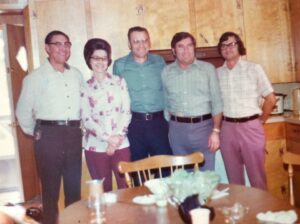
Full Circle
In the early 1900s, Maurice was a quiet town of dirt roads, small farms, and neighbors who knew each other by name. That was the world that Ducré and Olive stepped into, and it was that world that they learned what it meant to belong to a place. Their lives were built on steady work, shared burdens, and the belief that family and community were two sides of the same coin.
Today, Maurice is no longer just a farming village. Paved roads carry steady traffic, new neighborhoods rise where cane once grew, and businesses line Highway 167. Yet in the center of it all are the threads of the Ducré Broussard family’s story. The buildings still stand: Wil’s IG, Fred’s Plumbing & Electric, Ray’s Appliance, and Rod’s TV & Radio Repair. A daughter whose passion for education educated generations of Maurice families. Each one is a reminder of a family that began with two people working side-by-side and grew into a legacy that shaped a town.
Ducré and Olive never set out to leave a mark. No one ever does. They ran a store, raised their children, and lived their faith quietly. But the lessons passed down became part of Maurice’s character. Their children, grandchildren, and great-grandchildren carried those values forward, not just in the businesses they built but in the way they showed up for their neighbors.
If you travel the streets of Maurice today, you will find more than the echo of their names. You will find the living proof of what they believed: that the strength of a community is built in the daily acts of care between its people. And if you listen closely, beneath the hum of modern life, you might catch a hint of that earlier rhythm, the slow creek of a store screen door, the sound of a neighbor calling your name, the kind of everyday connections that make a place feel like home.
Author’s Note:
My sincere thanks to Craig Broussard, Rod Broussard, Sidney Broussard, Randy Broussard, and others for sharing their memories, family stories, and details that made this story possible. This article is only one chapter in a larger story, and there is always more to be remembered and told. If you have photographs, stories, or facts about Ducré and Olive Broussard, their family, or the early days of Maurice, please share them by emailing david@mauricetoday.com. Updates and addenda to this story will be shared with readers in the future so that Maurice’s legacy can continue to be preserved.

